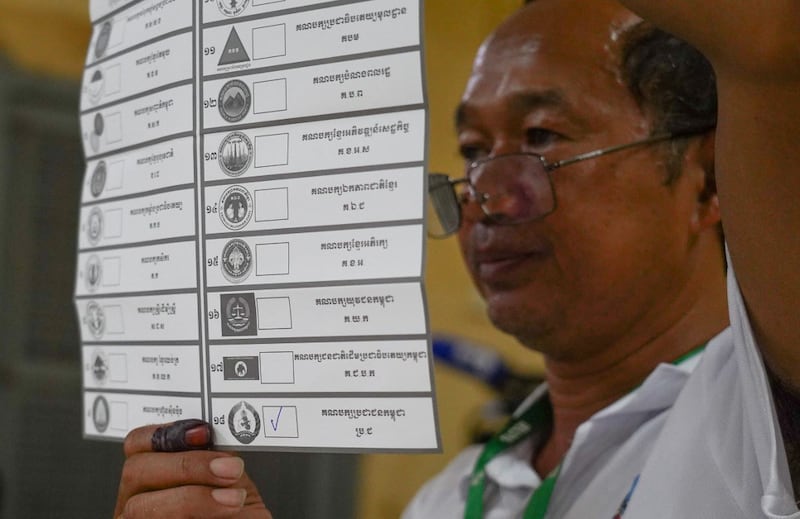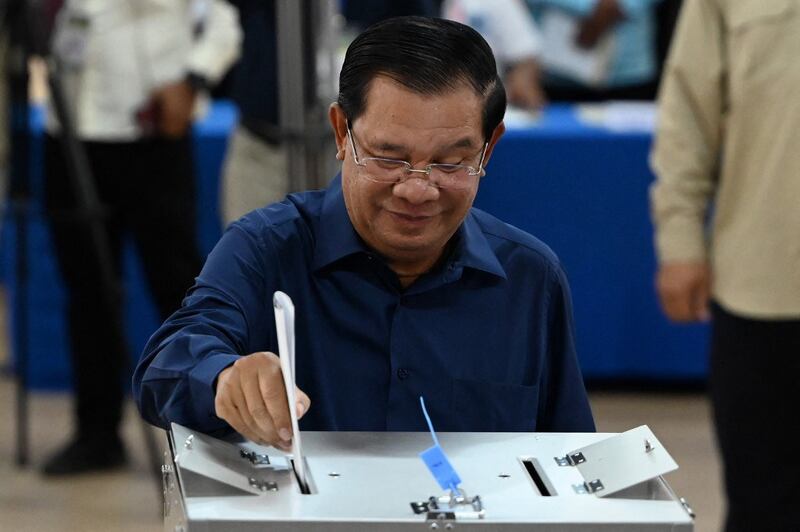UPDATED at 9:10 p.m. EDT on 07-23-2023
Cambodians have finished voting in a one-sided parliamentary election that's expected to be an easy victory for the ruling Cambodian People's Party as Prime Minister Hun Sen prepares to hand over power to his eldest son in the coming weeks.
Preliminary results show the CPP winning 120 seats in the National Assembly, with the royalist Funcinpec party securing five seats, according to a message posted by the prime minister on Telegram.
Hun Sen’s CPP has neutralized the political opposition over the last six months by either threatening or co-opting activists.
In May, the National Election Committee banned the main opposition Candlelight Party from running in the election, citing inadequate paperwork. Opposition activists have said the decision was politically motivated.
The ban meant that the CPP didn't have any major challengers on the ballot. Funcinpec, which formed a coalition government with the CPP for several years in the 1990s, and 16 other parties qualified for the election but weren't expected to be serious challengers.
An election observer in Koh Kong province near the Thai border told Radio Free Asia that there were no independent observers at his polling station.
“In previous elections, people stayed and watched the election process after they cast their votes,” he said. “But this time, people knew the outcome – that the ruling party will win the election. So there’s no point for them to monitor.”
U.S. State Department spokesman Matthew Miller said in a statement that the department was troubled that the elections were “neither free nor fair.”
The United States will pause some foreign assistance programs and has taken steps “to impose visa restrictions on individuals who undermined democracy” in Cambodia ahead of the elections, he said in the statement released on Sunday.
“Cambodian authorities engaged in a pattern of threats and harassment against the political opposition, media, and civil society that undermined the spirit of the country’s constitution and Cambodia’s international obligations,” Miller said.
“These actions denied the Cambodian people a voice and a choice in determining the future of their country.”
Both the NEC and Hun Sen said that 84 percent of eligible voters had cast their ballot on Sunday. Official election results were expected to be announced between Aug. 9 and Sept. 4.

Worries about democracy
The prime minister said in a voice message Sunday evening that exiled opposition leader Sam Rainsy’s plan to sabotage the election – by urging people to destroy their ballot – had failed.
Earlier this month, the National Assembly approved an amendment to the election law that prohibited those who didn‘t cast a vote in Sunday’s election from running for office in future elections.
At least three opposition party members who were accused of destroying their ballot were arrested on Sunday, authorities said. Another 40 opposition activists were being sought by police for allegedly being involved with plans to destroy ballots.
The NEC said in June that those who “urge voters not to go to vote, recreate mistrust in the election and disturb the electoral process” could face fines of between 5 million-20 million riels (US$1,200-4,800) and prison terms. It did not specify the possible length of prison term.
Photos of dozens of spoiled ballots were posted on Sam Rainsy’s Facebook page on Sunday.
CPP spokesman Sok Ey San estimated that the number of spoiled ballots across the country was between 200,000 and 300,000.
Several voters interviewed by RFA on Sunday showed off the black ink on their fingers used to mark their ballots. They said they felt pressured to vote.
One voter in Kandal province, who asked not be named, told RFA that many people at her polling station were unhappy about the coercion.
“I am worried and think that democracy will not be reinstated,” she said. “Everything from social morals to human rights have declined.”
Dozens of members of the Candlelight Party – the only party that could have mounted a serious challenge to the CPP – were arrested in several provinces in recent months.
Some detained activists received pardons, were released from prison and given government positions after they publicly switched their allegiance to the CPP.

‘The main opposition party is absent’
More than 23,000 polling stations opened nationwide at 7 a.m. Hun Sen and his wife, Bun Rany, drove a black Mercedes to the polls near his home in Kandal province, just outside of Phnom Penh. Hun Sen did not say anything to reporters.
The prime minister’s eldest son, Hun Manet, voted at a primary school in Phnom Penh. He told journalists that he came to cast his vote to fulfill his obligations as a citizen.
Hun Sen, who has held power since 1985, told a Chinese television station last week that the 45-year-old Hun Manet could become prime minister as soon as three weeks after the election.
Ros Sotha, the executive director of the Cambodian Human Rights Action Coalition, said he and his group traveled from Phnom Penh to Kandal and Kampong Chhnang provinces to monitor polling stations.
Wat Dambok Khpos in Phnom Penh was crowded in the morning, but near empty by afternoon. At other polling stations, there were almost no voters after 12 p.m. – just election officials and observers, he said.
“The unhappy reaction of the people seems to be due to the fact that the main opposition party is absent from the election,” he said.
Translated by Sok Ry Sum. Edited by Matt Reed.
THIS STORY WAS UPDATED TO INCLUDE DETAILS FROM A U.S. STATE DEPARTMENT STATEMENT.
